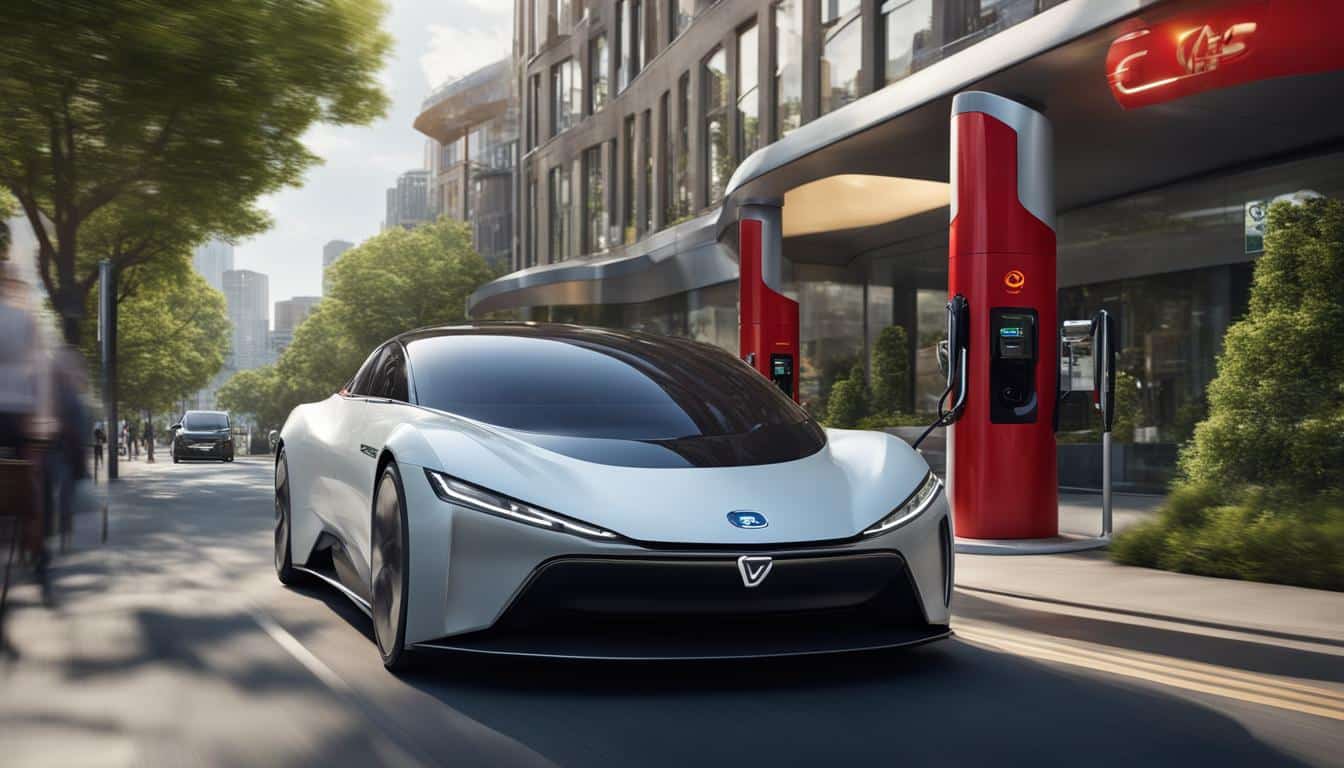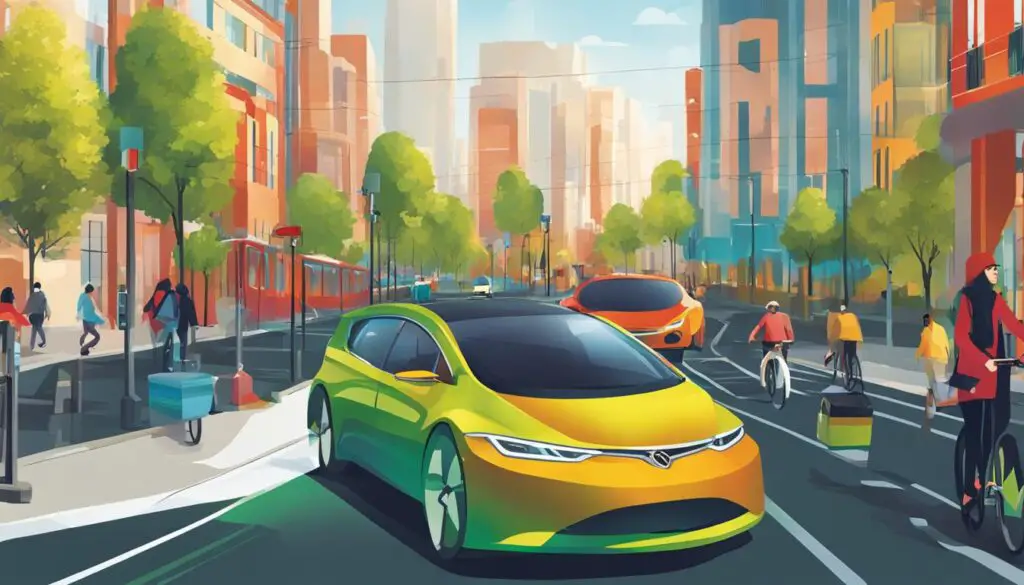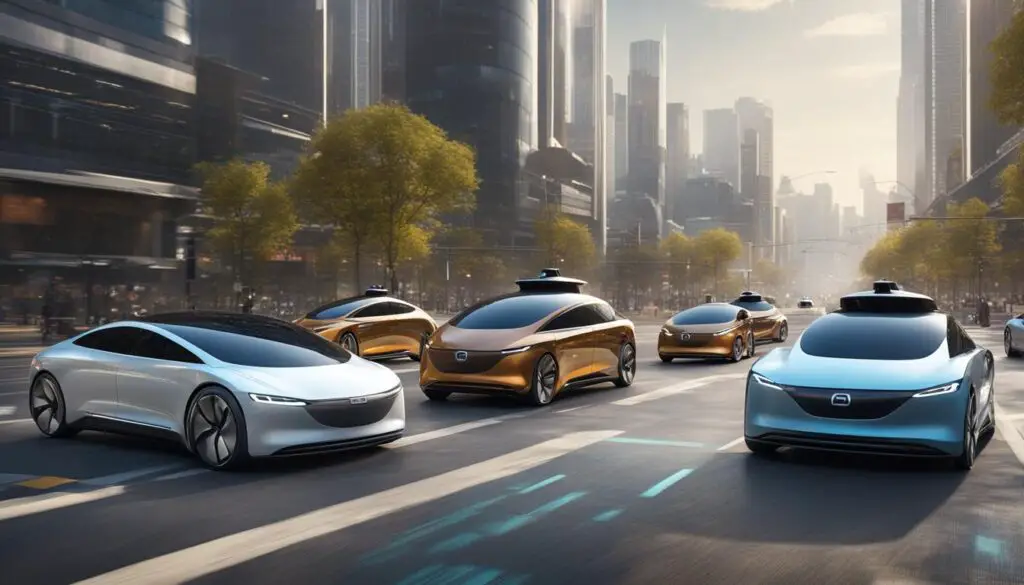
Future of Mobility: Comparing EVs with Traditional Gasoline Engines
As technology continues to advance, the future of mobility is rapidly evolving. One significant shift we are witnessing is the rising popularity of electric vehicles (EVs) over traditional gasoline-powered cars. In this article, I will compare the two and explore the reasons behind the growing appeal of EVs.
When it comes to sustainability and reducing the carbon footprint, EVs have proven to be a game-changer. With zero tailpipe emissions, they present a cleaner and greener alternative to gasoline-driven cars. Additionally, EVs offer long-term cost savings due to lower maintenance expenses and the lower cost of electricity compared to gasoline.
While EVs might have a higher sticker price upfront, the potential for savings over time is substantial. The reduced reliance on costly gasoline can lead to significant monthly savings. Furthermore, governments around the world are incentivizing the transition to electric vehicles through tax credits and rebates, making them an increasingly affordable option for consumers.
Another advantage of EVs lies in their performance. Improved technology has resulted in EVs boasting quick acceleration and smooth handling. This, coupled with the near-silent operation, enhances the overall driving experience and offers a glimpse into the future of mobility.
Key Takeaways:
- EVs provide a cleaner and more sustainable mode of transportation.
- They offer long-term cost savings due to lower maintenance expenses and the lower cost of electricity.
- Improved EV technology has led to better performance and a more enjoyable driving experience.
- Governments are incentivizing the transition to electric vehicles through tax credits and rebates.
- EVs contribute to a healthier environment by reducing carbon emissions.
Advantages of Electric Vehicles
When it comes to transportation, electric vehicles (EVs) have been gaining significant attention and popularity. EVs offer a range of advantages over traditional gasoline cars, making them a compelling choice for environmentally conscious individuals as well as those looking to save on long-term costs.
Cost Savings
One of the key advantages of electric vehicles is the potential for cost savings in the long run. Unlike gasoline cars, EVs have fewer moving parts and require less maintenance. This means lower maintenance costs and fewer trips to the mechanic for regular oil changes, spark plug replacements, and other typical maintenance tasks.
“Electric vehicles have fewer moving parts, resulting in lower maintenance costs compared to gasoline cars.”
Additionally, the cost of electricity for charging an electric vehicle is typically lower than the cost of gasoline, resulting in significant savings over time. According to the U.S. Department of Energy, driving an electric vehicle can save owners an average of $770 per year in fuel costs compared to gasoline-powered cars.
Zero Emissions
Another major advantage of electric vehicles is their contribution to a cleaner and greener environment. EVs produce zero tailpipe emissions, meaning they do not release pollutants such as carbon dioxide, nitrogen oxides, or particulate matter into the air during operation.
“Electric vehicles produce zero tailpipe emissions, helping to reduce air pollution and improve air quality.”
This is particularly important in urban areas where air pollution from traditional vehicles can lead to health problems and environmental degradation. By choosing an electric vehicle, individuals are actively reducing their carbon footprint and promoting a cleaner and healthier environment for future generations.
Performance and Handling
Contrary to some misconceptions, electric vehicles are not only environmentally friendly but also offer impressive performance and handling. Thanks to their electric motors, EVs provide instant torque, resulting in quick acceleration and a smooth driving experience.
“Electric vehicles offer quick acceleration and smooth handling, providing an enjoyable driving experience.”
Furthermore, their battery placement on the vehicle’s floor provides a low center of gravity, enhancing stability and handling on the road. This combination of performance and handling makes electric vehicles a compelling choice for both eco-conscious drivers and those seeking a thrilling and enjoyable driving experience.
Overall, electric vehicles offer numerous advantages over traditional gasoline cars. From cost savings through lower maintenance and fuel costs to zero tailpipe emissions that contribute to a cleaner environment, the benefits of electric vehicles are clear. With advancements in technology and a growing charging infrastructure, EVs are becoming an increasingly attractive and accessible option for individuals and families alike.
| Advantages | Electric Vehicles | Gasoline Cars |
|---|---|---|
| Environmental Impact | Zero tailpipe emissions | Release greenhouse gases and pollutants |
| Cost | Lower maintenance and fuel costs | Higher maintenance and fuel costs |
| Performance | Quick acceleration and smooth handling | Varying performance depending on model |
| Range | Varies by model, typically improving over time | Longer range, with easy refueling infrastructure |
| Charging | Requires charging infrastructure | Refueling infrastructure widely available |
| Noise Pollution | Quiet operation | Engine noise |
Other Eco-Friendly Options
While electric vehicles are the most well-known sustainable car option, there are other eco-friendly options available for those who want to reduce their environmental impact. These alternatives include hybrid cars, plug-in hybrid cars, and fuel cell vehicles.
Hybrid cars combine a gasoline engine with an electric motor, offering a balance between fuel economy and power. The electric motor assists the gas engine, reducing fuel consumption and emissions. Hybrid cars are a popular choice for those who want to reduce their carbon footprint while still enjoying the convenience of a gas-powered vehicle.
Plug-in hybrid cars take the concept of hybrid cars a step further by incorporating a larger battery that can be charged using an external power source. This allows for extended electric driving range, reducing the dependency on gasoline. Drivers can enjoy the benefits of electric propulsion for shorter trips while having the flexibility of a gasoline engine for longer journeys.
Fuel cell vehicles use hydrogen as a fuel source to generate electricity, producing only water vapor as a byproduct. These vehicles have the advantage of emitting zero tailpipe emissions, contributing to improved air quality. While fuel cell vehicles are still in the early stages of development and face challenges in terms of infrastructure and hydrogen availability, they hold promise as a sustainable transportation option.
“By expanding the range of eco-friendly options, we provide consumers with alternatives that align with their green values. Whether it’s a hybrid car, plug-in hybrid, or fuel cell vehicle, these choices enable us to reduce our environmental impact and drive towards a cleaner future.”
Comparison of Eco-Friendly Options
| Criteria | Hybrid Cars | Plug-in Hybrid Cars | Fuel Cell Vehicles |
|---|---|---|---|
| Fuel Efficiency | High | High (Electric Mode) | High |
| Emissions | Low | Low (Electric Mode) | Zero |
| Driving Range | Medium | Medium (Electric Mode) | High |
| Charging Infrastructure | N/A | Requires Charging Stations | Requires Hydrogen Stations |
This table provides a comparison of fuel efficiency, emissions, driving range, and charging infrastructure for different eco-friendly options. It highlights the strengths and considerations for each type of vehicle, allowing consumers to make an informed choice based on their specific needs and preferences.

The Future of Cars: Autonomous Driving and Beyond
The future of cars is rapidly evolving, and at the forefront of this transformation is autonomous driving. Also known as driverless cars, autonomous vehicles have the potential to revolutionize the way we commute and travel. By leveraging advanced technologies such as artificial intelligence and sensors, autonomous driving aims to make roads safer, more efficient, and accessible to all.
One of the key benefits of autonomous driving is the potential to eliminate human error, which is the leading cause of car accidents. With advanced sensors and algorithms, these vehicles can analyze the environment, anticipate potential hazards, and react faster than a human driver. This has the potential to dramatically reduce car accidents, making our roads safer for everyone.
But the impacts of autonomous driving go beyond safety. By optimizing routes and traffic flow, autonomous vehicles can help reduce congestion on our roads. With improved traffic management and efficient navigation systems, cars can communicate with each other and coordinate their movements, leading to smoother traffic flow and shorter commute times.
Moreover, autonomous driving has the potential to provide increased mobility for individuals who are unable to drive, such as the elderly or people with disabilities. By removing the need for human drivers, autonomous vehicles can provide a new level of independence, allowing more people to access transportation services and participate in various activities.
However, as with any emerging technology, there are challenges and concerns that need to be addressed. One of the major concerns is cybersecurity. As autonomous vehicles rely heavily on complex software and communication systems, there is an increased risk of hacking and unauthorized access. Safeguarding these vehicles and ensuring the privacy of passengers’ data is crucial to gain public trust and widespread adoption.
Another concern is the potential impact on jobs for human drivers. As autonomous driving becomes more prevalent, there will likely be a shift in the employment landscape, with fewer jobs available for professional drivers. It is essential to consider measures to support and retrain those affected by this shift in the job market.
Despite these challenges, the future of autonomous driving is promising. As technology continues to advance, we can expect to see more autonomous vehicles on our roads, transforming the way we commute and travel. The potential benefits in terms of safety, efficiency, and accessibility make autonomous driving a key element in shaping the future of cars.

The Impact of Autonomous Driving:
“Autonomous driving is not just about convenience or novelty; it has the power to revolutionize transportation and improve the quality of life for millions of people.” – Elon Musk
The quote by Elon Musk highlights the transformative potential of autonomous driving. Its impact goes beyond mere convenience or novelty; it has the power to change the way we live, commute, and interact with our cities. Whether it’s improving safety, reducing traffic congestion, or providing mobility for all, autonomous driving is poised to reshape the future of cars.
Electric vs Gasoline: Which is More Cost-Effective?
When comparing the cost-effectiveness of electric vehicles and gasoline cars, electric vehicles have several advantages. Despite their higher initial cost, government incentives and lower fuel and maintenance expenses make them more cost-effective in the long run. Electric cars also have a higher resale value compared to gasoline cars. Additionally, the cost of electricity is more predictable than the volatile prices of gasoline. These factors contribute to the cost-effectiveness of electric vehicles.
In terms of the initial purchase price, electric vehicles may seem more expensive than their gasoline counterparts. However, it is important to consider the long-term cost savings. Electric cars are eligible for government incentives and tax credits, significantly reducing the upfront cost. These incentives vary depending on the country and region, but they can make a substantial difference in the final price.
Furthermore, electric vehicles have lower fuel and maintenance expenses compared to gasoline cars. Charging an electric car is generally more cost-effective than filling up a gasoline car, especially as the prices of gasoline continue to fluctuate. The cost of electricity is generally more stable, making it easier to plan and budget for transportation expenses. Additionally, electric vehicles have fewer moving parts and require less maintenance than traditional gasoline cars, resulting in further cost savings over time.
“Electric vehicles offer significant cost savings in the long run due to lower fuel and maintenance expenses, making them a cost-effective choice for environmentally conscious consumers.”
Another aspect that contributes to the cost-effectiveness of electric vehicles is their higher resale value. As the demand for electric vehicles continues to grow, their resale value remains strong. This means that when it comes time to sell or trade-in an electric car, owners can expect a higher return on their investment compared to a gasoline car.
It is worth noting that the cost-effectiveness of electric vehicles may vary depending on individual circumstances. Factors such as electricity rates, driving habits, and the availability of charging infrastructure can impact the overall cost of owning an electric car. However, in most cases, electric vehicles prove to be a more cost-effective choice in the long run.
Overall, when considering the cost-effectiveness of electric vehicles versus gasoline cars, electric vehicles offer numerous advantages. Despite the higher initial cost, government incentives, lower fuel expenses, lower maintenance costs, and higher resale value make electric vehicles a compelling choice for cost-conscious individuals. The predictability of electricity costs and the environmental benefits of zero tailpipe emissions further contribute to their cost-effectiveness. As the market for electric vehicles continues to expand and technology advances, the cost-effectiveness of electric vehicles is only expected to improve.
Conclusion
In conclusion, electric vehicles have the potential to revolutionize the future of mobility. With their cost savings, zero tailpipe emissions, and advancements in technology, electric vehicles offer a viable alternative to traditional gasoline cars. Despite challenges like range anxiety and the need for charging infrastructure, ongoing technological advancements and the increasing availability of charging stations are making electric vehicles more accessible and attractive to consumers.
The future of mobility is heading towards electric vehicles, transforming the way we travel and positively impacting the environment. As we continue to embrace the benefits of electric vehicles, we can expect cleaner air, reduced dependence on fossil fuels, and a more sustainable transportation system. The transition to electric vehicles presents an opportunity to create a greener future and mitigate the effects of climate change.
By choosing electric vehicles over traditional gasoline cars, we can contribute to a more sustainable transportation industry and a healthier planet for future generations. As the automotive industry continues to innovate, electric vehicles will play a significant role in shaping the future of mobility, providing us with a cleaner, greener, and more efficient way to get from point A to point B.
FAQ
Why should I consider buying an electric vehicle?
Electric vehicles offer long-term cost savings due to lower maintenance costs and the lower cost of electricity compared to gasoline. They also produce zero tailpipe emissions, reducing air pollution and contributing to a healthier environment.
What are the advantages of electric vehicles?
Electric vehicles offer cost savings in the long run, thanks to lower maintenance costs and the lower cost of electricity compared to gasoline. They also produce zero tailpipe emissions, reducing air pollution. Additionally, electric vehicles are becoming more sophisticated in terms of performance, with quick acceleration and better handling.
Are there other eco-friendly car options besides electric vehicles?
Yes, there are other eco-friendly options available. Hybrid cars, which have a gas engine and an electric motor, offer a balance between fuel economy and power. Plug-in hybrid cars have a larger battery that can be charged using an external power source. Fuel cell vehicles, which use hydrogen as fuel, emit only water vapor. These options provide alternatives for those who want to reduce their environmental impact.
What is autonomous driving?
Autonomous driving, also known as driverless cars, is the future of mobility. It has the potential to make roads safer by eliminating human error and reducing car accidents. Autonomous driving could also reduce traffic congestion by optimizing routes and increasing the efficiency of transportation.
Which is more cost-effective, electric vehicles or gasoline cars?
When comparing the cost-effectiveness of electric vehicles and gasoline cars, electric vehicles have several advantages. Despite their higher initial cost, government incentives and lower fuel and maintenance expenses make them more cost-effective in the long run. Electric cars also have a higher resale value compared to gasoline cars. Additionally, the cost of electricity is more predictable than the volatile prices of gasoline.
